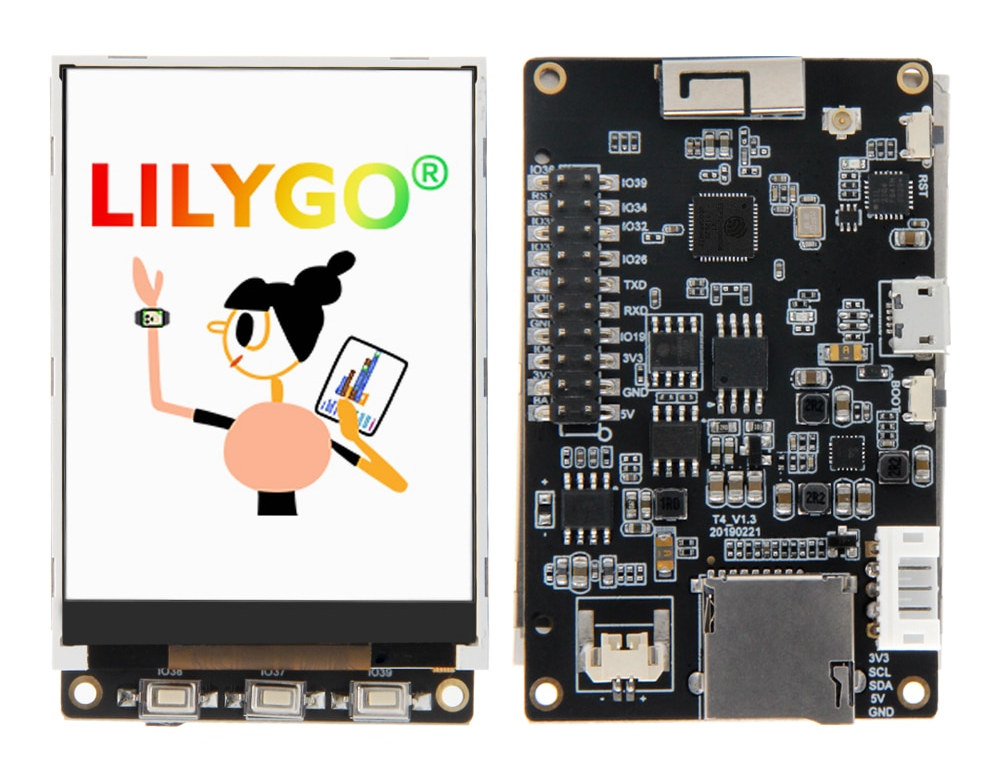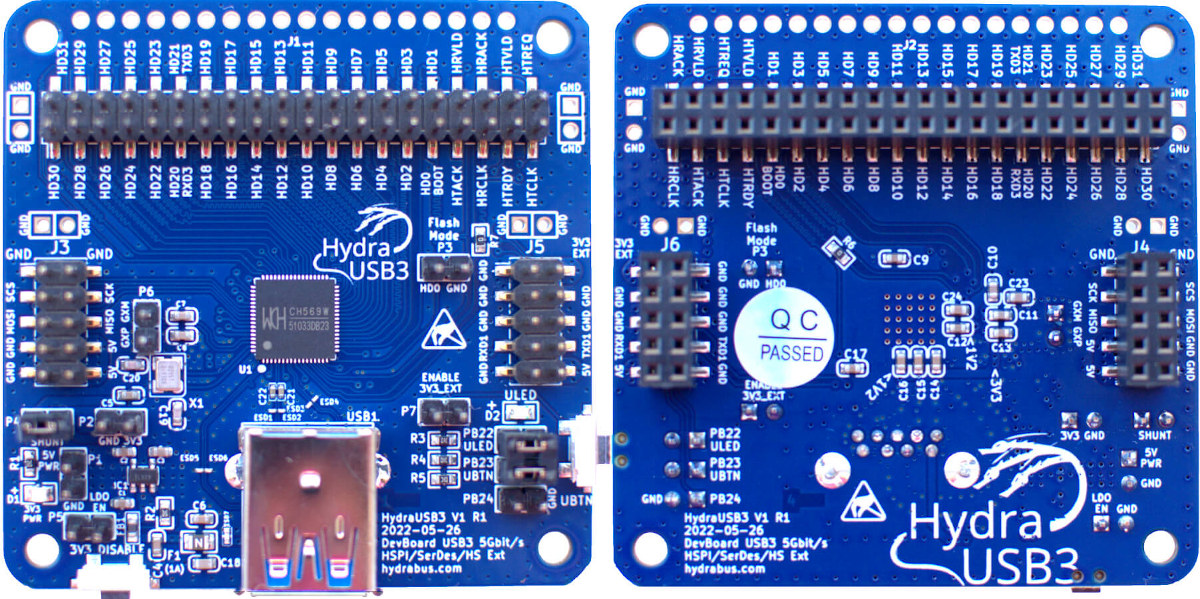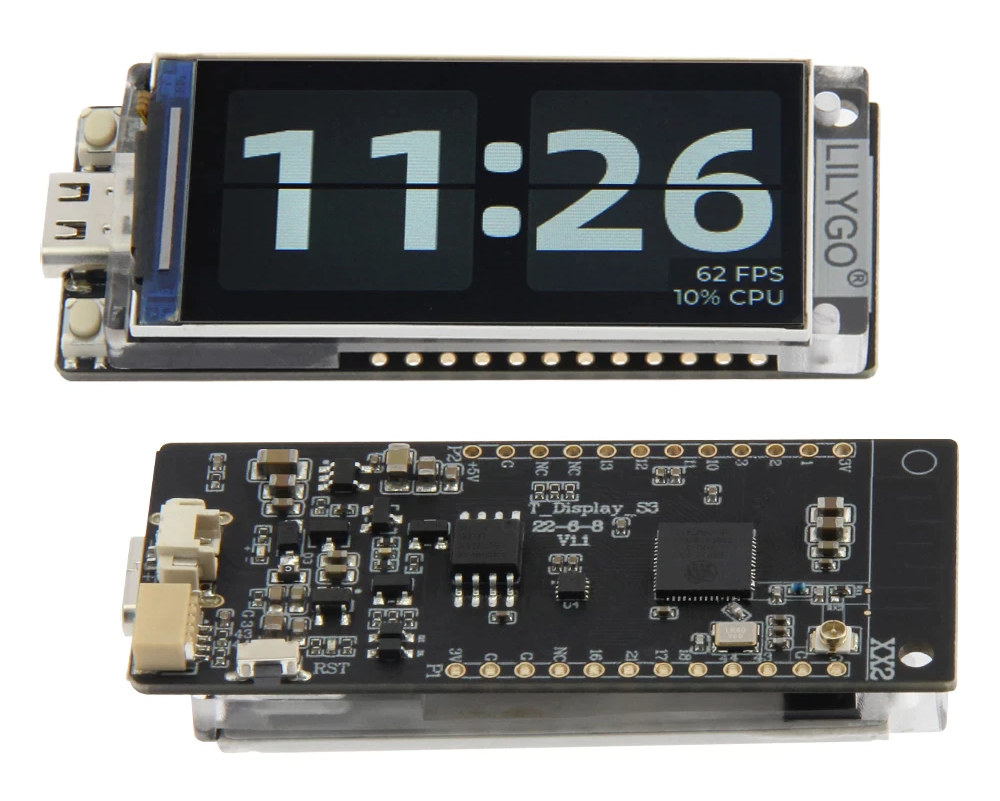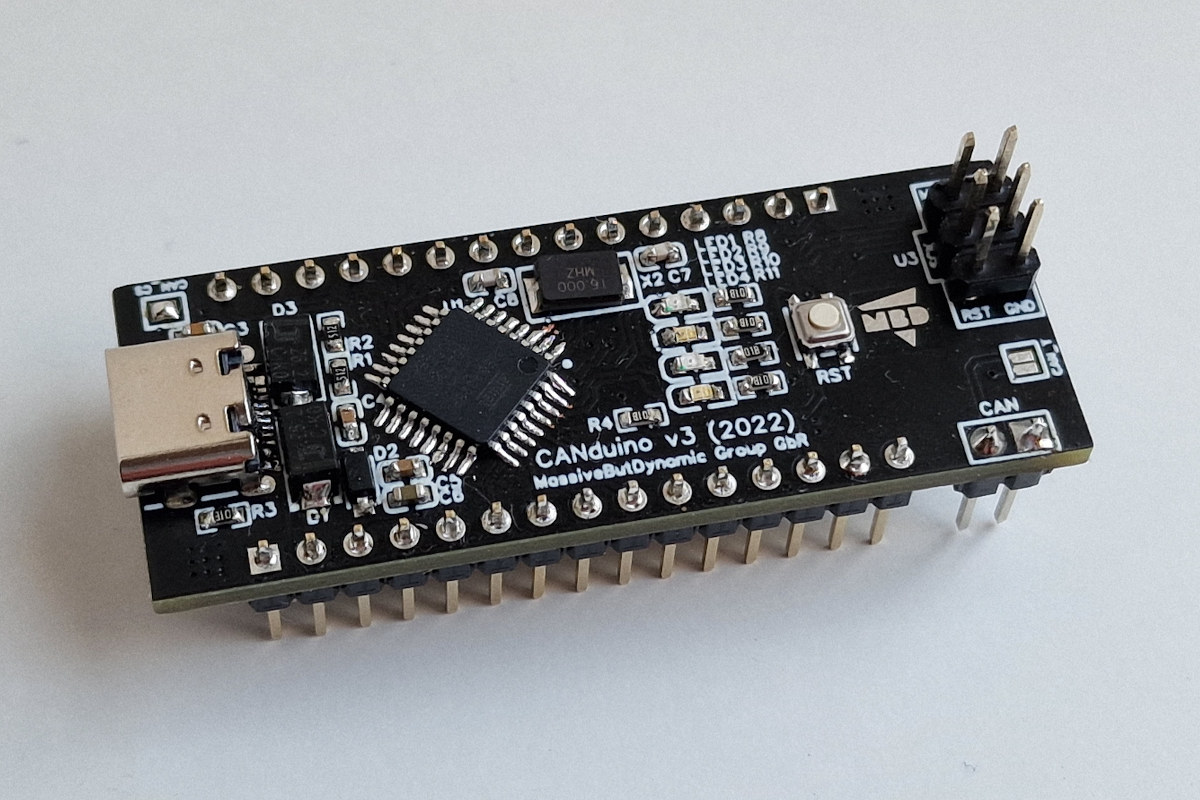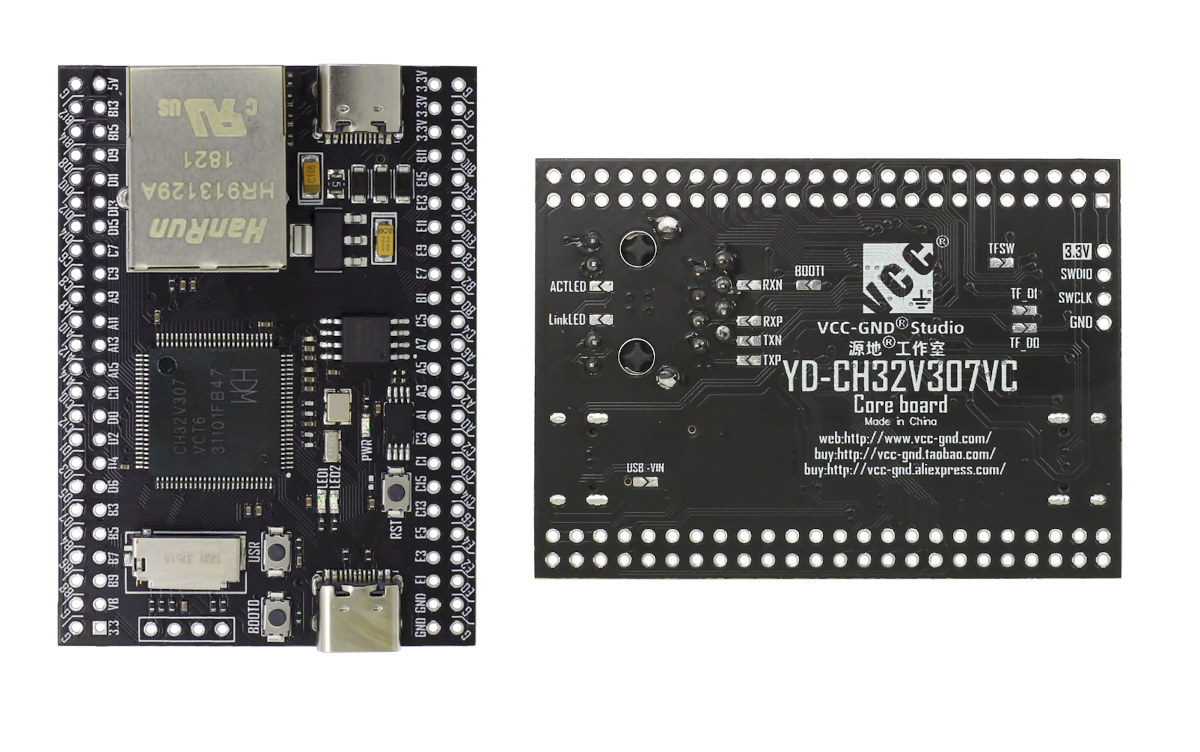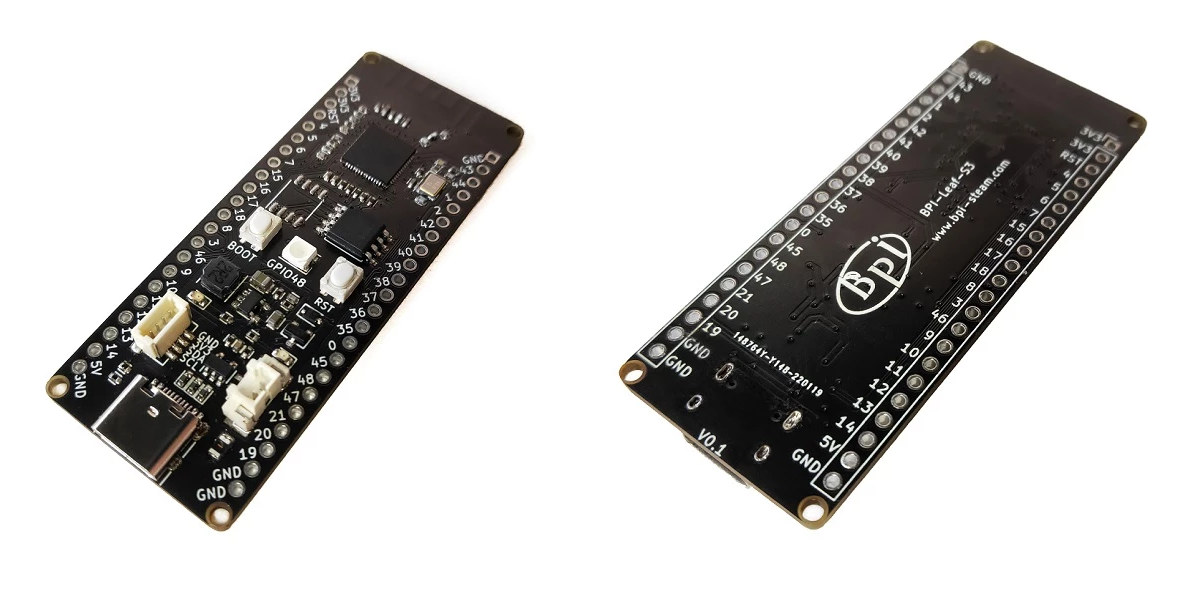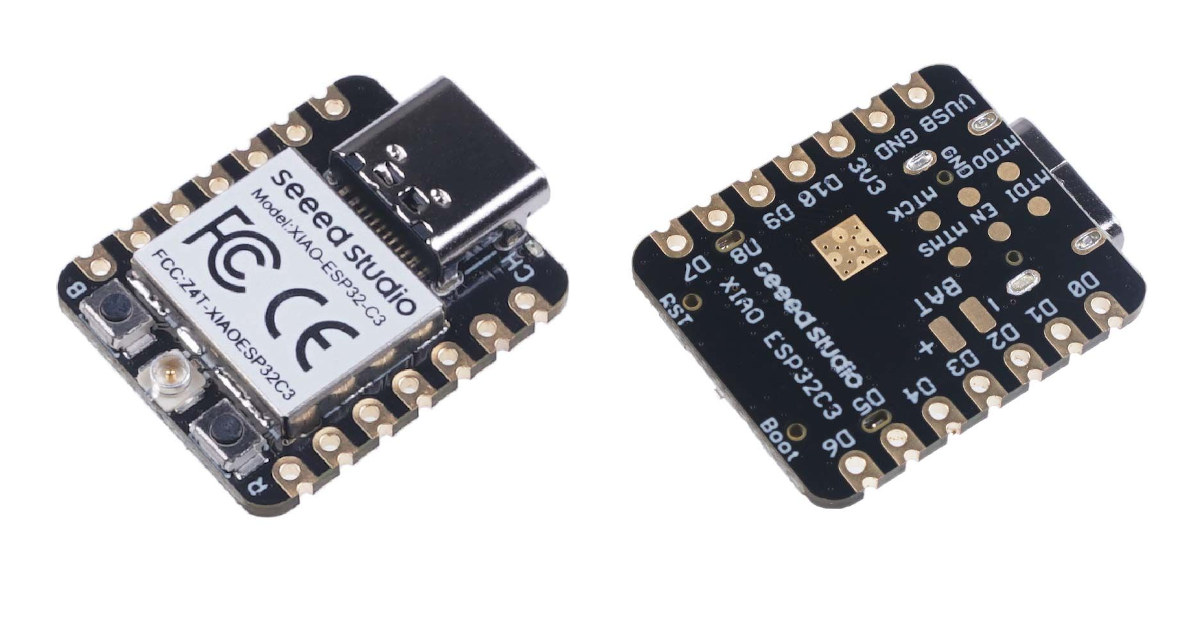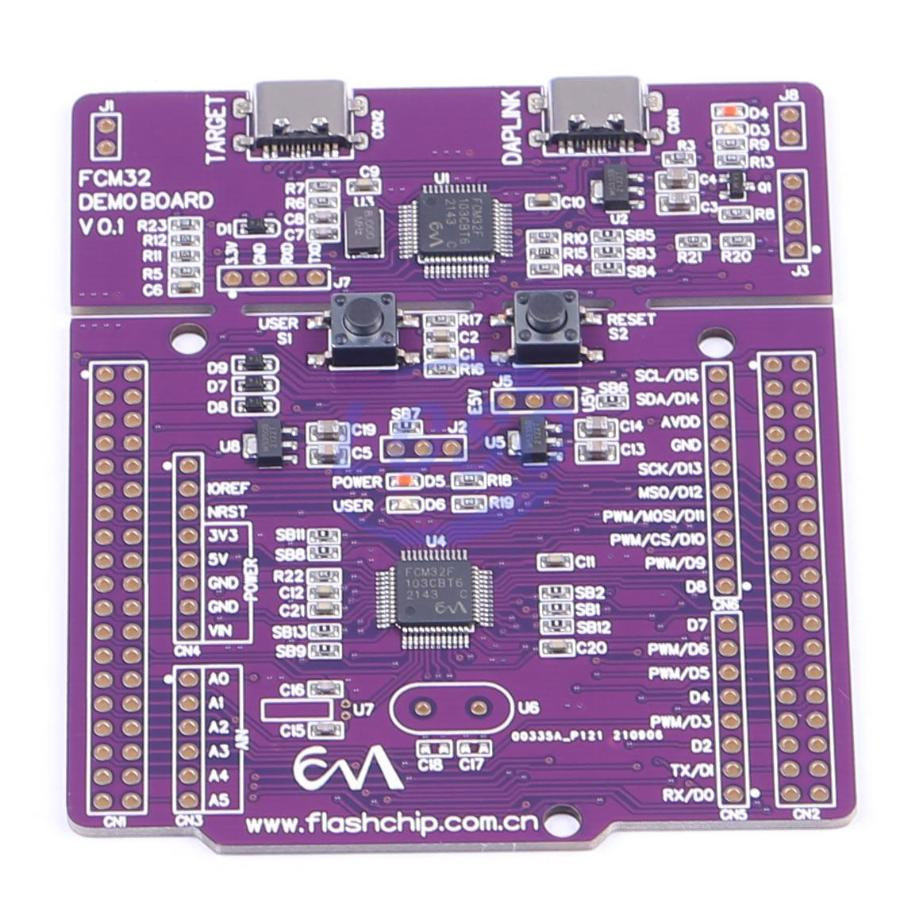LilyGO has launched yet another ESP32 board with an integrated color display. The TTGO T4 offers a 2.2-inch or 2.4-inch color display, LiPo battery support, but in contrast to many other boards from the company, features a battery charging circuitry based on Injonic IP5306 “fully-integrated power bank system-on-chip with 2.1A charger, 2.4A discharger”. The WiFi and Bluetooth IoT board is also equipped with 4MB flash, a MicroSD card socket, 8MB PSRAM, a 20-pin GPIO header and a 5-pin I2C connector for expansion, and a few buttons for programming and user control. TTGO T4 v1.3 specifications: Wireless MCU – Espressif Systems ESP32 dual-core Tensilica LX6 microcontroller @ up to 240 MHz with 520 KB SRAM, wireless connectivity RAM – 8MB SPRAM (ISSI PN18S32) Storage – 4MB SPI NOR flash, MicroSD card slot Connectivity (ESP32) 2.4 GHz 802.11 b/g/n Wi-Fi 4 Bluetooth 4.2 BR/EDR and Bluetooth LE 3D antenna and u.FL connector […]
HydraUSB3 RISC-V MCU board combines USB 3.0 with HSPI and SerDes high-speed interfaces
Benjamin VERNOUX has launched the HydraUSB3 V1 board based on WCH CH569 RISC-V MCU as a developer platform to experiment with high-speed protocols like HSPI and SerDes through a USB 3.0 interface. It’s the third board from Benjamin we feature here, after the STM32-based HydraBUS and the HydraNFC v2 shield delivering up to 1600 mW for NFC charging and connectivity. The HydraUSB3 v1 is quite different since it does not involve NFC at all, and instead leverages the CH569’s high-speed interfaces including USB 3.0 (5 Gbps), HSPI (3.8Gbps), and SerDes (>1.2Gbps). HydraUSB3 V1 specifications: MCU – WCH CH569 32-bit RISC-V (RISC-V3A) RV32IMAC MCU @ 120MHz with 16KB 32-bit SRAM, 96KB configurable 128-bit SRAM, 448KB code flash, 32KB data flash USB – 1x USB 3.0 host/device port that supports the USB 3.0 SS built-in PHY (5Gbps) and USB 2.0 built-in PHY FS/LS/HS (480Mbps) High-speed I/Os High-Speed Parallel Interface (HSPI) up to […]
T-Display-S3 board offers ESP32-S3 WiSoC, 1.9-inch color LCD, and LiPo battery support
LilyGO T-Display-S3 is an ESP32-S3 WiFi and Bluetooth LE IoT development board with a 1.9-inch color LCD and support for LiPo batteries that follows the company’s T-QT ESP32-S3 board with a tiny 0.85-inch display introduced earlier this month. The new board offers the same layout as the previous T-Display RP2040 or ES32 boards, but the 1.14-inch display has been replaced with a larger 1.9-inch display that covers most of the board, and thanks to the ESP32-S3 microcontroller, gains proper Bluetooth 5.0 support, as well as vector instructions for AI acceleration. T-Display-S3 specifications: Wireless MCU – Espressif Systems ESP32-S3R8 dual-core Tensilica LX7 @ up to 240 MHz with vector instructions for AI acceleration, 512KB RAM, 8MB PSRAM, wireless connectivity Storage – 16MB flash Connectivity via ESP32-S3 2.4 GHz 802.11 b/g/n Wi-Fi 4 with 40 MHz bandwidth support Bluetooth Low Energy (BLE) 5.0 connectivity with long-range support, up to 2Mbps data rate. […]
CANDuino v3 – A Microchip ATmega168PA board with CAN bus, Arduino Nano form factor
CANduino v3 is the third revision of MassiveButDynamic’s CAN bus board with Arduino Nano form factor based on Microchip ATmega168PA 8-bit AVR microcontroller, Microchip MCP2515 CAN controller with an SPI interface, and Microchip MCP2551 CAN transceiver suitable for 12V and 24V systems. The CANDuino v3 board is now slightly narrower in order to give access to two rows on each side when installed on a breadboard, comes with a USB Type-C port to reduce the number of cables needed, and the CAN bus function can be deactivated via a jumper in order to use the CANduino as a normal Arduino Nano. CANDuino v3 specifications: MCU – Microchip ATmega168PA 8-bit AVR microcontroller @ up to 16 MHz with 16KB flash, 512 bytes EEPROM, 1 KB SRAM CAN Bus CAN L/H header and CAN bus termination Microchip MCP2515 CAN controller connected to the AVR microcontroller over SPI. Supports CAN V2.0B at 1 […]
YD-CH32V307VCT6 RISC-V MCU board comes with Ethernet and plenty of I/Os
At the beginning of the year, we wrote about WCH CH32V307 RISC-V microcontroller and a development board with 8 UART ports controlled over Ethernet. I’ve now been informed of a similar, but much more compact by VCC-GND Studio named “YD-CH32V307VCT6”. Besides the 144 MHz RISC-V microcontroller, the board features a 10Mbps Ethernet port, two USB Type-C ports, SPI flash, EEPROM, a microSD card socket, and four rows of 24 pins each for a total of 96 pins exposing all pins out of the LQFP100 package. YD-CH32V307VCT6 board specifications: MCU – WCH CH32V307VCT6 32-bit RISC-V microcontroller @ 144 MHz with 256K Flash, 64K SRAM Storage – 32Mbit SPI NOR flash (W25Q32), 64kbit EEPROM (24C64), MicroSD card slot Networking – 10 Mbps Ethernet USB – 1x USB 2.0 Type-C port (High Speed: 480 Mbps), 1x USB 2.0 Type-C port (Full Speed: 12 Mbps) Expansion – 2x 48-pin headers with 2 x 12-bit […]
Banana Pi BPI-Leaf-S3 ESP32-S3 board launched for $7.5
Banana Pi is better known for its Arm Linux boards, but the company’s Banana Pi BPI-Leaf-S3 board features Espressif ESP32-S3 dual-core WiFi & BLE AI processor, with compatibility with ESP32-S3-DevKitC-1 minus a built-in USB to TTL chip, and added support for battery and an I2C connector. Banana Pi Leaf (BPI-Leaf-S3) specifications: Wireless MCU – Espressif Systems ESP32-S3 dual-core Tensilica LX7 @ up to 240 MHz with vector instructions for AI acceleration, 512KB RAM, wireless connectivity Storage/Memory – 8MB flash, 2MB SPRAM Connectivity via ESP32-S3 2.4 GHz 802.11 b/g/n Wi-Fi 4 with 40 MHz bandwidth support Bluetooth Low Energy (BLE) 5.0 and Mesh connectivity with long-range support, up to 2Mbps data rate. PCB antenna USB – 1x USB Type-C OTG port for power and programming Expansion 2x 22-pin headers with up to 36x GPIO, 2x 12-bit ADC, 14x touch sensor inputs, 4x SPI, 2x I2C, 2x I2S, LCD interface, DVP camera […]
Seeed Studio outs $5 XIAO ESP32C3 board with WiFi and BLE, battery support
Seeed Studio’s XIAO family of tiny MCU boards expands with the XIAO ESP32C3 board equipped with ESP32-C3 WiFi and Bluetooth LE (BLE) microcontroller, support for LiPo batteries, and following the same 21 x 17.5mm form factor. If I’m counting right, this is the fifth member following the original XIAO based on Microchip SAMD21G18 Cortex-M0+ MCU, XIAO RP2040, and the nRF52840-based XIAO BLE and XIAO BLE Sense boards which I tested with Edge Impulse. XIAO ESP32C3 specifications: Wireless MCU – Espressif Systems ESP32-C3 single-core RISC-V microcontroller @ 160 MHz with 400KB SRAM, 384KB ROM, 4MB flash Wi-Fi 4 & Bluetooth LE 5.0 connectivity Antenna – External u.FL antenna USB – USB Type-C port for power and programming Expansion I/Os 2x 7-pin headers with 1x UART, 1x I2C, 1x SPI, 11x GPIO (PWM), 4x ADC, I2S 3.3V I/O voltage (not 5V tolerant) Debugging – JTAG pads Misc – Reset button, Boot button, […]
Flashchip FCM32 is yet another alternative to STM32 microcontroller
Once upon a time, people tried to avoid STM32 fakes and clones, but in a world where companies are allegedly purchasing washing machines to extract a few unavailable components, people have started to look for alternatives, and last week I wrote about the Geehy APM32 family of STM32 clones. But I had never heard about Flashchip Microelectronics FCM32 microcontrollers, and they are not that easy to find in search engines, so they must be relatively new. The company appears to make both FCM32F clones and FCM32H derivatives with no direct equivalent STM32 part numbers, a higher clock frequency, and faster flash. For example, the FCMF030F4P6 will match the specifications of STMF030F4P6 as far as I can tell. The good news is that the datasheet is available in both Chinese and English. The FCM32H030C8T6 appears to be a higher performance version of STM32F030C8T8 / FCM32F030C8T8 with a 100 MHz frequency, and […]


